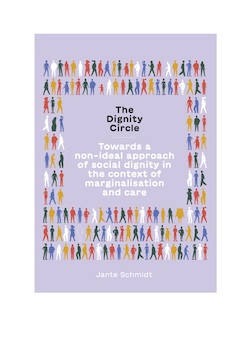How do you actually make social policy more humane?

31 January 2024
In recent years, municipalities have been given increasing responsibilities in formulating and implementing social policy. As a result, human rights have become increasingly important at the local level as well, with the concept of human dignity at its core. How can you work with this concept in practice? Jante Schmidt investigated the social side of dignity and conducted qualitative research among people with multiple problems and social workers.
It turns out that people do not always know how to name their dignity, but they do know what it feels like to be ridiculed, ignored or stigmatized. When people with multiple problems seek help, they have to deal with all kinds of agencies, laws and rules. In the process, they sometimes feel unworthy of treatment. Jante Schmidt explains: "People are treated as a number or file instead of a unique person. They may not feel seen or heard. Or they feel treated like a child or meet suspicion."
Dignity Circle
Schmidt points to the need for accessible language around dignity, especially at a time when more and more people feel marginalized. To this end, she presents the Dignity Circle as a tool in her dissertation. This consists of the main forms of dignity violation and dignity promotion. Jante Schmidt: "Promoting social dignity starts with identifying dignity violations. The Dignity Circle helps put words to this. It also provides tools to deal with the dilemmas that are part of promoting dignity."
Dignity as a social process
In her dissertation, Schmidt provides insight into the complexities of dignified care and support. "This is always a balancing act; a practice that protects social dignity can simultaneously threaten it in other ways." For policymakers, it is helpful to understand dignity as a social process and less as an ideal that you may or may not meet. This makes room for questions such as: do well-intentioned policies have unintended consequences that lead to dignity violations? From this point, the route to more humane policies really comes into view.

Jante Schmidt, The Dignity Circle. Towards a non-ideal approach of social dignity in the context of marginalisation and care, ISBN: 978-94-6483-667-7
Information on her PhD Defence.
In her doctoral research, Jante Schmidt shows what human dignity means for vulnerable residents of human rights city Utrecht. She presents a tool with which attention to dignity can be made concrete in professional practices.